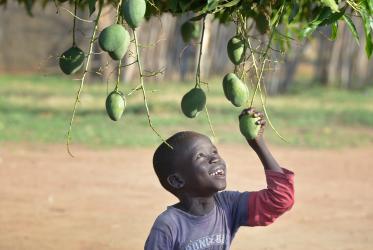Statement by the WCC general secretary on the occasion of the Conference on World Food Security in Rome, 3-5 June 2008
5 June 2008
"The fields of the poor may yield much food, but it is swept away by injustice"
Proverbs 13:23
Ensuring food security for all of the world's people is among the greatest challenges facing humanity in the early years of the 21st century. The churches have an essential role to play, and to be effective we must face the global food crisis together. While churches and agencies of Christian witness have provided important services in the past, there is so much more that we could achieve. Individually and collectively, the time has come for churches to reassess and strengthen their policies of advocacy and support in addressing this crisis.
The World Council of Churches (WCC) is closely following the High-Level Conference on World Food Security now being held in Rome, 3-5 June 2008. We applaud the determination being shown there in tackling the impact of climate change on food production and bio-energy, and confronting the challenges this situation poses to the achievement of global food security. The WCC commends the UN initiative in convening the conference in which many heads of state and governments are participating. We express the hope that in response to the call by the UN secretary general, Ban Ki-Moon, to act boldly the world leaders may demonstrate their commitment to act against hunger and poverty and that this will lead to timely action. Millions of world citizens are eagerly awaiting the decision of the conference, hoping that it will make a difference in their lives as far as access to food is concerned.
The WCC is engaged in a review of its own policies and projects touching on food supply and its place in the quest for economic justice. Policy recommendations, along with a detailed statement on the global food crisis, will be submitted to the WCC executive committee for adoption at their next meeting in September 2008.
While climate change is one factor behind the global food crisis, the WCC views the primary cause of the current crisis as inappropriate human actions which have induced climate change and skyrocketing food prices. Human actions driven by greed have created poverty, hunger and climate change. Humanity must be challenged to overcome its greed.
The scandal of hunger demands the immediate attention of the churches. An estimated 850 million people in the world today suffer from hunger. Of this figure, about 820 million live in developing countries - the very countries expected to be most affected by climate change. Many of the hungry die for lack of food; and many more suffer from diseases and disabilities caused by insufficient or unbalanced diets. It is often children who are victims of malnutrition and who are deprived of the possibility of fullness of life. The gospel that calls us to love our neighbours compels Christians and their churches to become more involved in meeting the needs of this world.
As far back as 1975, the WCC lifted up for the churches' attention the issues of famine, malnutrition and questions related to food production and distribution policies. Emphasis was placed on ensuring that small farmers have access to land and the capacity to produce sufficient food for themselves and their families. At that time, 400 million people had an insufficient supply of food. Today this number has doubled. The WCC attributes this problem mainly to present patterns of production and distribution. The market continues to be the main mechanism pushed by the prevailing development paradigm to take care of food production and distribution. The same mechanism is responsible for providing incentives to avaricious business entities who speculate on commodity (including food) and oil prices. The recent upsurge in the prices of food staples makes it increasingly difficult to achieve the Millennium Development Goal of reducing the number of poor people by half by the year 2015.
The World Council of Churches is deeply concerned and outraged by this untenable situation and calls on the churches to formulate and implement programmes that seek to deal with hunger and its structural causes.
Related to concerns around food production and distribution are the consequences of unsustainable agricultural activities on the environment. Climate change has been exacerbated by the mismanagement of resources; and the production of bio-fuels on a massive scale (in the name of reducing climate change-inducing green-house gas emissions) has not only contributed to rising food prices but may also have adverse effects on soil and water quality and biodiversity. Moreover, the increasing dominance of agri-corporations that are aimed at generating high profits has helped to propagate farming practices that damage the environment.
Even as our executive committee prepares to take further action, the WCC calls for a life-giving agriculture that nurtures the earth and provides nutritious and affordable food for all people. We call for the participation of small farmers in the production of food, and for the just distribution of food resources. As churches, we must continue to accompany and support sustainable communities and movements of farmers and landless rural workers.
The world's churches are called to advocate against the production of agri-fuels at the expense of food production and the environment, and to serve as living examples in the promotion of life-giving agriculture.
Rev. Dr Samuel Kobia
General Secretary
World Council of Churches



